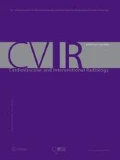The European Board of Interventional Radiology (EBIR) professional examination has been a vital factor in the evolution of our young subspecialty and a key component in the progression of interventional radiologists (IRs) into clinical specialists. It has helped to achieve a degree of harmonisation in training and quality standards throughout Europe, creating excellence amongst our future generation of IRs. Individuals who achieve EBIR certification earn the credential of being trained to a high standard of interventional practice, demonstrating that they are trained to carry out safe and effective treatments for patients.
EBIR is designed for recently qualified radiologists working as fully trained medical specialists who want to further specialise in the field of interventional radiology. The aim of the examination is to affirm the candidate’s knowledge and expertise in interventional radiology as an additional qualification. Although currently a voluntary examination, it has shown the potential benefits of increasing employability, easing movement across borders and demonstrating expertise to colleagues, other specialists and regulatory authorities.
Examinees must have completed a full radiology training programme, additional training in IR and have a log of procedures, thus confirming their technical abilities and experience. Consequently, EBIR is able to focus on testing their higher-level cognitive thinking—that is, their ability to evaluate, analyse and apply their knowledge in order to show their abilities to be independent practitioners in IR.
The examination attained accreditation in 2017 for its high quality after being reviewed by the European Union of Medical Specialists’ Council of European Specialist Medical Assessment (UEMS-CESMA). Some national bodies and societies have adopted the examination as part of their national training pathway (i.e. the German, Australasian and Dutch Societies of Interventional Radiology) and in some cases becoming a requirement for future revalidation. This has led to increasing interest worldwide and currently more than 20% of EBIR holders reside outside of Europe. The rapid momentum of growth and popularity has led to the unexpected challenge of registrations far beyond the original capacity, resulting in increasing waiting times for IRs wanting to sit the examination. The Executive Committee of CIRSE has therefore tasked the EBIR Examination Committee with revising the examination process to allow greater numbers to sit the examination without compromising the quality of the overall examination itself.
Traditionally, in the medical field, evaluations such as these have been done through a combination of multiple choice questions (MCQs) and oral examinations, including the EBIR. However, oral examination is a major obstacle to increasing the number of examinees per sitting. Multiple research studies have demonstrated that the higher cognitive abilities historically assessed with oral methods can be tested using sophisticated and well-written selected-response questions [1, 2]. The validity and defensibility of this examination format have been well established and are at minimum equivalent to, and in some cases better than, oral examinations [3]. In terms of reliability, selected-response items are consistently superior [4, 5]. Additionally, they are less labour intensive, more efficient and much less time-consuming to score. Following the current trends and development of other board examinations, the EBIR Examination Committee has decided that the EBIR examination will replace the oral component with a written one starting at the CIRSE 2019 examination in September. This will, in turn, enable a significant increase in the number of possible examinees at each sitting of the examination and, in combination with full digitalisation of the examination, speed up the reporting of results to candidates.
EBIR is becoming a vital part of IR training throughout Europe and beyond. The council of the European Board of Interventional Radiology is continuing to develop the examination to meet the challenges of the constantly evolving specialty of IR, making it fairer, more relevant and more readily available to IRs worldwide. The Board would encourage all IRs to certify their expertise by taking the EBIR at their earliest opportunity.
References
Hift RJ. Should essays and other “open-ended”-type questions retain a place in written summative assessment in clinical medicine? BMC Med Educ. 2014;14:249.
Elstein AS, Shulmann LS, Sprafka SA. Medical problem solving: an analysis of clinical reasoning. Cambridge: Harvard University Press; 1978.
Maatsch J, Huang R. An evaluation of the construct validity of four alternative theories of clinical competence. In: Proceedings of the 25th annual RIME conference. Chicago: American Association of Medical Colleges; 1986. p. 69–74.
Swanson DB. A measurement framework for performance-based tests. In: Hart I, Harden R, editors. Further developments in assessing clinical competence. Proceedings of the second Ottawa conference. Montreal: Can-Heal Publications; 1987. p. 13–45.
Norcini JJ, Swanson DB, Grosso LJ, Webster GD. Reliability, validity and efficiency of multiple-choice question and patient management problem item formats in assessment of clinical competence. Med Educ. 1985;19:238–47.
Author information
Authors and Affiliations
Corresponding author
Ethics declarations
Conflict of interest
Raman Uberoi: Deputy Chairperson of the EBIR Examination Council, Muirne Spooner: Educational Consultant for the EBIR, Maria Weren: Head of Certification and Accreditation Office, CIRSE, Mardis Karlsdottir: Staff at Certification and Accreditation Office, CIRSE, Otto M. Van Delden: Chairperson of the EBIR Examination Council.
Ethical Approval
This article does not contain any studies with human participants or animals performed by any of the authors.
Additional information
Publisher's Note
Springer Nature remains neutral with regard to jurisdictional claims in published maps and institutional affiliations.
Rights and permissions
About this article
Cite this article
Uberoi, R., Spooner, M., Weren, M. et al. EBIR Evolution: Meeting the Challenge for Twenty-First-Century IR. Cardiovasc Intervent Radiol 42, 485–486 (2019). https://doi.org/10.1007/s00270-019-02172-2
Published:
Issue Date:
DOI: https://doi.org/10.1007/s00270-019-02172-2

